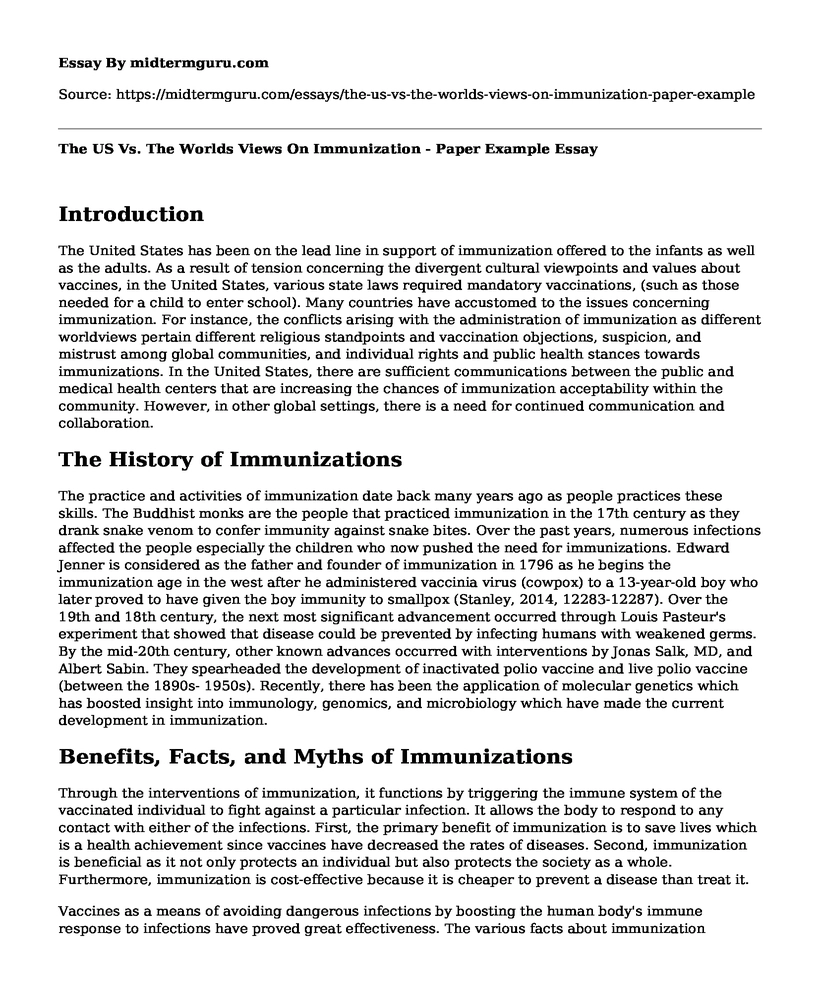Introduction
The United States has been on the lead line in support of immunization offered to the infants as well as the adults. As a result of tension concerning the divergent cultural viewpoints and values about vaccines, in the United States, various state laws required mandatory vaccinations, (such as those needed for a child to enter school). Many countries have accustomed to the issues concerning immunization. For instance, the conflicts arising with the administration of immunization as different worldviews pertain different religious standpoints and vaccination objections, suspicion, and mistrust among global communities, and individual rights and public health stances towards immunizations. In the United States, there are sufficient communications between the public and medical health centers that are increasing the chances of immunization acceptability within the community. However, in other global settings, there is a need for continued communication and collaboration.
The History of Immunizations
The practice and activities of immunization date back many years ago as people practices these skills. The Buddhist monks are the people that practiced immunization in the 17th century as they drank snake venom to confer immunity against snake bites. Over the past years, numerous infections affected the people especially the children who now pushed the need for immunizations. Edward Jenner is considered as the father and founder of immunization in 1796 as he begins the immunization age in the west after he administered vaccinia virus (cowpox) to a 13-year-old boy who later proved to have given the boy immunity to smallpox (Stanley, 2014, 12283-12287). Over the 19th and 18th century, the next most significant advancement occurred through Louis Pasteur's experiment that showed that disease could be prevented by infecting humans with weakened germs. By the mid-20th century, other known advances occurred with interventions by Jonas Salk, MD, and Albert Sabin. They spearheaded the development of inactivated polio vaccine and live polio vaccine (between the 1890s- 1950s). Recently, there has been the application of molecular genetics which has boosted insight into immunology, genomics, and microbiology which have made the current development in immunization.
Benefits, Facts, and Myths of Immunizations
Through the interventions of immunization, it functions by triggering the immune system of the vaccinated individual to fight against a particular infection. It allows the body to respond to any contact with either of the infections. First, the primary benefit of immunization is to save lives which is a health achievement since vaccines have decreased the rates of diseases. Second, immunization is beneficial as it not only protects an individual but also protects the society as a whole. Furthermore, immunization is cost-effective because it is cheaper to prevent a disease than treat it.
Vaccines as a means of avoiding dangerous infections by boosting the human body's immune response to infections have proved great effectiveness. The various facts about immunization according to the World Health Organizations include:
- Immunization through vaccination is the best way to protect against disease. Immunization does not seek to heal an individual that is already affected but help boost their immune system to help the body respond to the infection.
- Combined vaccines are beneficial and extremely safe.
- There is no link between immunization and autism.
- One should be vaccinated even in the risk of infection is minimal.
Although immunization has been proved to be safe and effective, there are various myths about immunization that are keeping vaccinations at the core of the controversy. The myths include:
- Natural immunity is better that vaccine-acquired immunity
- Vaccines cause sudden infant death syndrome (SIDS) and autism
- We do not need immunizations
- Vaccines contain harmful and unsafe ingredients
Impacts of Society from The New Point of View on Immunizations
As a result of the new points of view concerning the involvements of immunizations have delivered significant influences in society. For example, the confirmation of immunization causes autism as being a myth has helped individuals understand that this is not the case. The myth originated from a 1998 study by a British surgeon, Andrew Wakefield, whose research depicted significant errors and ethical violations. On the other hand, the issue concerning the increase of measles is another section that has delivered a substantial change to society through the creation of a new point of view. With this, it has helped the community understand that vaccines are worth the try.
Works Cited
Plotkin, Stanley. "History of vaccination." Proceedings of the National Academy of Sciences 111.34 (2014): 12283-12287.
Cite this page
The US Vs. The Worlds Views On Immunization - Paper Example. (2022, Sep 21). Retrieved from https://midtermguru.com/essays/the-us-vs-the-worlds-views-on-immunization-paper-example
If you are the original author of this essay and no longer wish to have it published on the midtermguru.com website, please click below to request its removal:
- Essay on Social Worker as an Advocate
- The Nursing Issue to be Presented - Research Paper
- Rising Prescription Drug Prices: A Major Issue and Call for Action - Essay Sample
- Essay Sample on Organ Donation
- Impact of Nurse Practitioners on Health Worldwide - Essay Sample
- Nursing Environment: Using Information Technology for Effective Decisions - Essay Sample
- Hospitals: Essential Social Institutions for Quality Healthcare - Essay Sample







